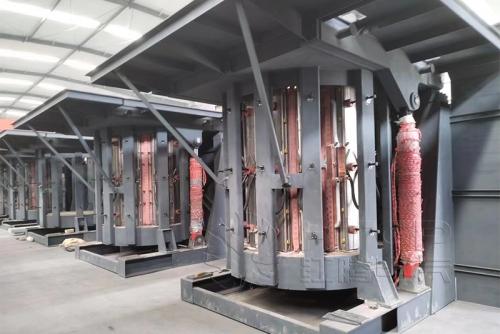Induction Melting Furnaces in Precious Metal Refining: Applications and Benefits

Induction
melting furnaces have significant applications and benefits in the field of
precious metal refining. Precious metals such as gold, silver, platinum, and
palladium are highly valued for their rarity, beauty, and industrial uses.
Refining these metals to their purest form requires specialized equipment, and
induction melting furnaces offer several advantages in this process.
In this
article, we will explore the applications and benefits of induction melting
furnaces in precious metal refining.
Efficient Melting
Induction
melting furnaces provide efficient and rapid melting of precious metals. The
high-frequency electromagnetic field generated by the furnace induces eddy
currents within the metal, resulting in quick and uniform heating. This ensures
that the precious metal reaches the melting point efficiently, reducing energy
consumption and saving time.
Precise Temperature Control
Precise
temperature control is crucial in the refining process to prevent metal loss or
damage. Induction melting furnaces offer excellent temperature control
capabilities, allowing operators to maintain the desired temperature within a
narrow range. This precision ensures that the metals are melted without
overheating or underheating, achieving optimal refining conditions.
Clean Melting Process
Induction
melting furnaces provide a clean and controlled melting process for precious
metals. The electromagnetic induction method eliminates the need for direct
contact with a heating element, minimizing the risk of contamination. This is
especially crucial in precious metal refining, where even small impurities can
significantly affect the purity and value of the final product.
Easy Alloying and
Customization
Induction
melting furnaces enable precise alloying and customization of precious metals.
By controlling the temperature and composition of the melt, operators can add
precise amounts of other metals to create alloys with specific properties. This
flexibility allows for the production of customized alloys tailored to specific
applications, such as jewelry, electronics, or industrial uses.
Economical and
Cost-Effective
Induction
melting furnaces offer economic advantages in precious metal refining. The
efficient melting process and precise temperature control help reduce energy
consumption, resulting in cost savings. Additionally, the clean melting process
minimizes metal losses, ensuring maximum yield and minimizing material waste.
High Throughput and
Productivity
Induction
melting furnaces are capable of handling large volumes of precious metal
material, enabling high throughput and productivity in refineries. Whether
processing scrap material or refining mined metal, the fast melting and
controlled temperature capabilities of induction furnaces contribute to efficient
and continuous production.
Safety and Operator-Friendly
Induction
melting furnaces prioritize safety and operator convenience. They are designed
with safety features such as electromagnetic shielding, temperature monitoring
systems, and automated controls to ensure safe and reliable operation. The
induction melting process eliminates direct contact between the heating element
and operators, minimizing the risk of burns or injuries.
Scalability and Versatility
Induction
melting furnaces offer scalability and versatility in precious metal refining
operations. They come in various sizes and configurations to accommodate
different production volumes and requirements. Whether a small-scale refining
operation or a large industrial facility, induction furnaces can be tailored to
meet specific needs, making them suitable for a wide range of refining
applications.
Improved Metal Quality
Induction
melting furnaces contribute to improved metal quality in precious metal
refining. The precise temperature control and clean melting process help remove
impurities, such as base metals, oxides, and other contaminants. This results
in higher-purity final products, meeting industry standards and customer
expectations.
Environmental Considerations
Induction
melting furnaces offer environmental benefits in precious metal refining. The
efficient melting process reduces energy consumption and lowers greenhouse gas
emissions compared to traditional melting methods. Additionally, the clean
melting process minimizes the release of harmful fumes and pollutants, ensuring
a safer and more environmentally friendly refining operation.
In Conclusion
Induction
melting furnaces play a crucial role in the refining of precious metals. Their
efficient melting capabilities, precise temperature control, clean process, and
economic advantages make them ideal for refining operations. With their ability
to handle large volumes, customize alloys, and ensure high-quality metal
output, induction furnaces contribute to the production of pure and valuable
precious metals used in various industries.
Post Your Ad Here
Comments